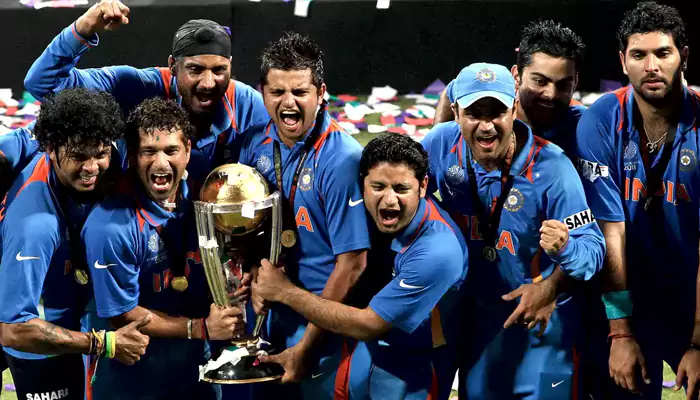
How the 2011 World Cup victory became a defining moment in our sporting story
In the extensive history of Independent India's 79 years in sport, few nights shine as brightly as April 2, 2011. Beneath the bright floodlights of Mumbai’s Wankhede Stadium, MS Dhoni’s bat traced a perfect arc through the air, sending Nuwan Kulasekara’s delivery soaring into the stands. In that one shot, a 28-year wait for cricket’s most coveted trophy was finally over, and a nation of over a billion people erupted with joy.
The 2011 ICC Cricket World Cup victory was more than a trophy; it re-established India among cricket’s giants, healed past heartbreaks, and created a glorious chapter in post-independence sporting history.

Credit: ESPN
The tenth edition of the ODI World Cup, co-hosted by India, Sri Lanka, and Bangladesh, held special significance for the Men in Blue. For Sachin Tendulkar, it was his final opportunity to win the one major prize that had eluded him. For the younger stars — Virat Kohli, Suresh Raina, and a fearless Yuvraj Singh — it was a chance to establish their own legacies.
The team was a well-balanced mix: Sehwag's explosive starts, Gambhir's resilience, Zaheer Khan's mastery of the new ball, Harbhajan's guile, and Dhoni's tactical intelligence. Gary Kirsten's steady coaching presence kept the team grounded under immense pressure.

Credit: ESPN
India’s group-stage campaign was not flawless. There was a dominant win over Bangladesh, as well as a high-scoring draw with England and a narrow defeat to South Africa. Nevertheless, with outstanding performances from Tendulkar, Yuvraj, and Zaheer, India secured second place in their group — paving the way for a quarter-final match against three-time defending champions Australia.

Credit: ESPN
Against Australia in Ahmedabad, Ricky Ponting’s century set India a target of 261. Tendulkar and Gambhir laid the foundation, but it was Yuvraj Singh, battling an undiagnosed illness, who delivered the decisive blow — an unbeaten 57 and two crucial wickets. With Suresh Raina’s support, India ended Australia’s 12-year World Cup dominance and advanced to the semi-finals.

Credit: ESPN
The Mohali clash with the PAK is rich in history and emotion. India’s 260/9, anchored by Tendulkar's nervous yet crucial 85, proved sufficient as the bowlers constricted PAK's chase. The 29-run victory was as much about composure under pressure as it was about skill.

Credit: ESPN
Sri Lanka’s Mahela Jayawardene scored a superb century in the final, setting India a target of 275. When Sehwag and Tendulkar fell early, the script threatened to turn tragic. However, Gautam Gambhir’s 97 and Dhoni’s unexpected promotion to No. 5 shifted the momentum.
In one of the most famous finales in cricket history, Dhoni’s undefeated 91 ended with that towering six. Yuvraj, named Player of the Tournament, wept openly. Tendulkar, carried on his teammates’ shoulders, finally experienced his World Cup moment.

Credit: ESPN
For a nation celebrating 79 years of independence, the 2011 World Cup victory serves as a poignant reminder that sport can unite people across all divides. It was redemption after the disappointment of 2007, a farewell gift to the game's greatest batter, and a testament to the power of belief under pressure.
In the long history of Indian sport, that April night will forever shine — a symbol of how far we have come, and how far we still dream to go.